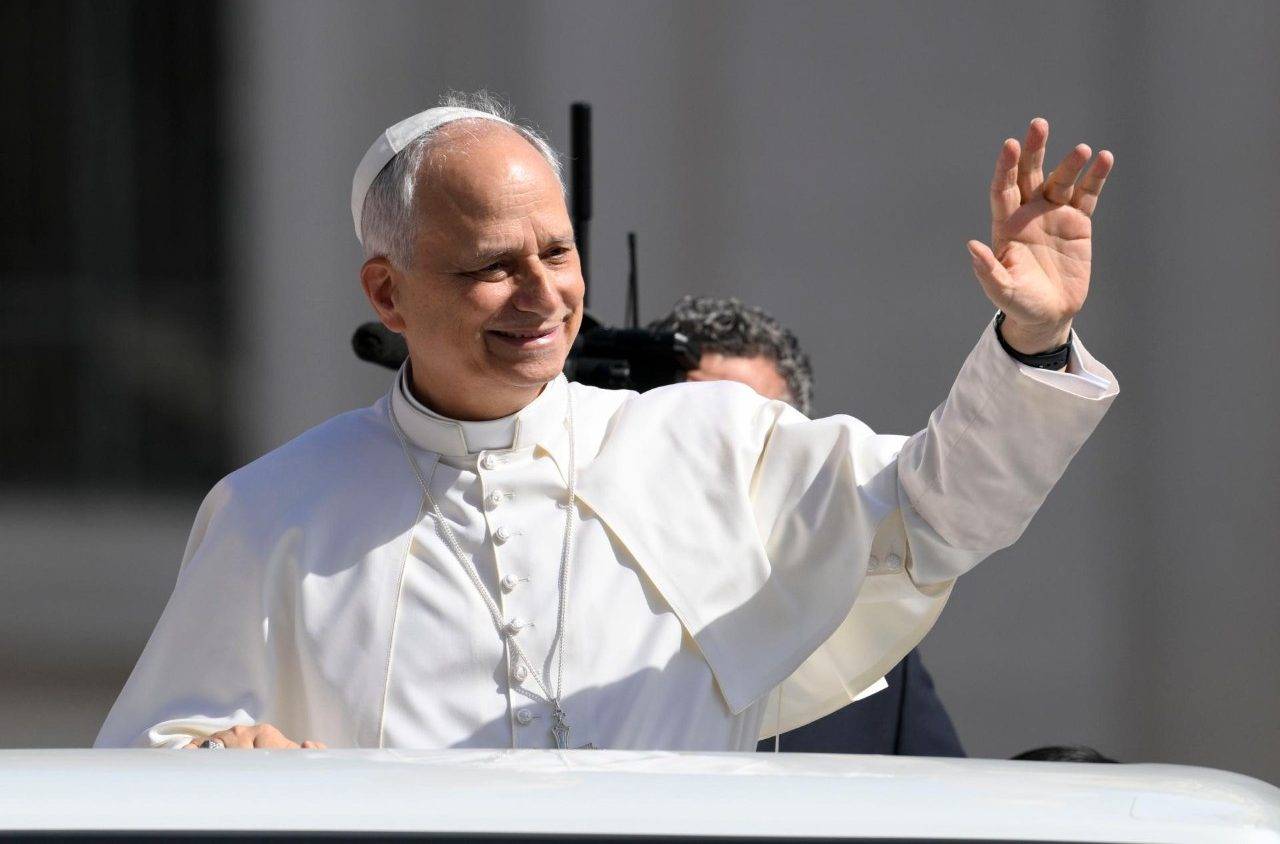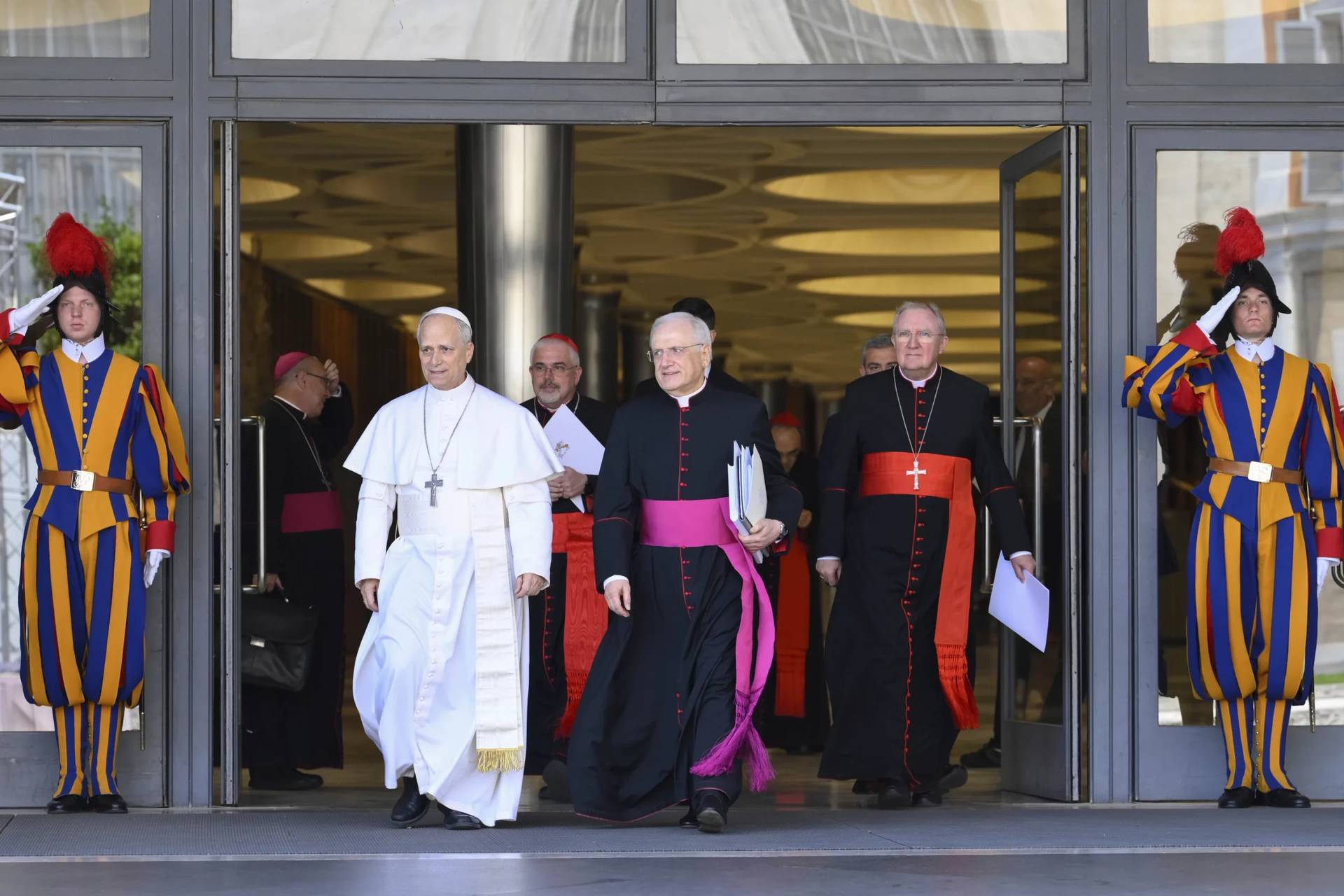Pope Francis, who next month turns 80, has been one of the most prolific communicators ever to occupy the Chair of St Peter. His interviews and airborne press conferences fill volumes, and there is no shortage of books about him — biographies like my own The Great Reformer, interpretative books and essays about his thinking by those who know his mind, as well as journalistic accounts of his papacy.
Two superb examples of the last, by the way, are both by Spanish journalists who cover the papacy in Rome: Javier Brocal’s El Papa de la Misericordia (‘Pope of Mercy’) and, just out, Juan Vincente Boo’s El Papa de la Alegría (‘The Pope of Joy’). Both deserve to be translated into English prontissimo.
Then there’s Mark Shriver’s Pilgrimage: My Search for the Real Pope Francis, published this week by Random House, which doesn’t fit into any of the usual categories.
It’s a deeply personal account, in many ways similar (and equally beautifully written) to his memoir A Good Man: Rediscovering My Father, Sargent Shriver. In both cases, he goes hunting for a hero, paying tribute to inspiring leadership and human greatness.
Shriver, for all his modesty, knows something about this, because he is cut from leadership cloth himself. Born to one of the nation’s great political families (“My uncle Jack Kennedy was also a master of making you feel he could touch your inside, touch your heart and gut”), his will certainly be the only book on Francis to carry an endorsement from the vice-president, Joe Biden.
Shriver once designed a program for Baltimore delinquents, hoping to “apply my Catholic notions of social justice through politics and activism,” and later created the Save the Children Action Network in Washington, D.C., which he now runs.
A lukewarm Catholic before 2013, in a funk over church scandals, and going to Mass mostly out of filial duty, Shriver found himself captivated by Francis, wanting to know more.
A publisher’s offer later, he set off for Argentina, armed with a driver, an interpreter and — he is kind often to acknowledge — my biography. (Another declaration of interest: I too have a blurb on the jacket.)
Partly what makes Pilgrimage so enjoyable and enlightening is Shriver’s mingling of humble naïveté and sophistication. He is often at sea in Buenos Aires, a city which overwhelms him with its scale and complexity (I laughed sympathetically at the number of times he arrives late for appointments after hair-raising taxi rides). As well as offering light moments, the faux-naïf viewpoint allows the reader to go searching with him, padding alongside.
But the American ingénu abroad is deceptive. Shriver is strategic in picking his interlocutors, and smart at homing in on the issues.
Pilgrimage doesn’t pretend to be a biography of Francis, but in burrowing into his past in search of what makes him tick, Shriver over two years goes to the right places and speaks to the key people.
On the way he lets us into his feelings, doubts, and personal vignettes; and although sometimes you want to know less about the author than he shares, the focus stays on Francis, and you increasingly trust Shriver to bring you ever closer.
His major theme is Bergoglio the boss and change-agent. He picks out a rare description of Francis’s childhood in a 2013 letter that was made public only in 2015, in which the pope recalls bitter quarrels and disagreements between relatives that terrified him and caused him to cry.
These events, wrote Francis, “left a deep mark on me in my childhood and created a desire in my heart for people to not fight, to remain united.” It is easy to locate here his abiding passion for what the pope calls a “culture of encounter” or “reconciled diversity.”
This is really Bergoglio’s big idea, one that is far more sophisticated than it sounds, born of readings in Romano Guardini, the practice of Ignatian spiritual discernment and his own practice of leadership. It is why the pope is so critical of modern politics, which in his view has turned away from the craft of consensus-building, absorbed by ideology or corrupted by wealth and power for its own sake.
As an eldest child of five, Bergoglio was always a natural leader, recognized (and occasionally resented) as such by his peers. As a Jesuit he became, as Shriver puts it, “a first-rate, even world-class, thinker and writer,” the only student at the Colegio Máximo, he discovers, ever to have scored perfect tens in every course he took. (This, by the way, is quite a scoop. The scores were never revealed, even within the college.)
Bergoglio’s brilliance and genius for leadership as a Jesuit provincial and rector could, however, be suffocating. In a terrific chapter describing a steak dinner with Jesuits who studied under Bergoglio, Shriver allows them to reminisce, and a common theme quickly emerges: “he was directing everything…even when he’s not there, he’s there…he was aware of everything…he knew exactly what was going on, everywhere…”
But he was a domineering presence who loved them; their affection for him and admiration of his qualities — his mysticism, his care for others, his extraordinary capacity to remember even the smallest details of people’s lives — shine through.
Shriver does not try to analyze and account for the polarization and breakdown within the Argentine Jesuits that Bergoglio’s leadership triggered, which led the newly elected Superior-General in 1983, Father Peter-Hans Kolvenbach, to intervene to unseat him. (Among the many achievements of Kolvenbach, who died at the weekend, was unknowingly to put Bergoglio on the path to the papacy.)
Instead, he allows the Jesuits he talks with simply to express the pain of it. The divisions, writes Shriver dramatically, were so deep and divisive that “grown men who lived through that period still can’t even describe it, they just shake their heads and want to change the subject.”
But he offers the fascinating insight that rather than authority per se, what Bergoglio wanted to keep above all was his mentoring role; he saw his vocation as a soul-guide (‘formator’ in Jesuit-speak) and had become deeply attached to that mission. When it was taken away — when Bergoglio was ‘deposed’ and sent to Córdoba to live in an elderly Jesuit house — the pain he suffered was the loss of what he believed to be God’s plan for his life.
But what he gained, paradoxically, was a deeper mission — of leadership outside the order, culminating in Rome. Shriver has learned that in Córdoba Bergoglio was offered the role of auxiliary bishop twice and twice turned it down.
Only later did he accept it, perhaps because it brought consolation, or because he saw it as inevitable (he was told at the time by a Jesuit close to him he could either be “a dead Jesuit or a live bishop”), or more likely a combination of both.
Shriver poses a question he never exactly answers: “Why did the pious, disciplined, focused patriarch blossom into the smiling, big-hearted, gregarious shepherd?” It is probably unanswerable, because it is the effect of the Holy Spirit on a soul.
But it is, at least, the right question: the transformation in Bergoglio was not from traditionalist to progressive, conservative to liberal, as some (lazy) media narratives claim, but an outworking of the other vocation, as pastor, he had begun to embrace in the early 1980s, when he was rector of the Máximo.
As bishop from 1992, says Shriver, “he would continue to learn, slowly and surely, a lesson he is teaching us all today: Neither power nor position bring God’s consolation.” Only service — above all of the poor — brings that, as Francis told the world at his inauguration Mass.
The book’s second half is Bergoglio’s journey into that pastoral vocation. It is familiar territory: the Saturdays in the shanties, the interfaith friendships, the cartoneros and the cercanía (‘closeness’) to the victims of tragedies. Yet it is freshly mapped out, in vivid colors and intriguing conversations.
Shriver peels back a Bergoglio who isn’t just giving, but receiving; who as he becomes more of a father becomes more of a brother; and who, as he goes out towards others, operates ever more deeply out of his Ignatian soul.
The book ends with the papal visit to the U.S. and his failure to secure an interview with Francis despite a stupendous list of friends in high places, whom he gratefully thanks in the Acknowledgements.
A New York Times review thinks Francis, “unimpressed by Shriver’s lineage and connections,” was humbling him. But Francis turns down dozens of such interview requests each week, from many others equally well or better connected. Connections are simply not the pathway to the pope.
The rejection of Shriver’s epic efforts to secure a sit-down with Francis teaches him something important, which is why he includes it, together with a reflection on the pope’s extraordinary Rome address to the popular movements in 2014 and again in Santa Cruz, Bolivia, last year.
Shriver senses something stirring here, which he never quite develops; he is challenged by a new kind of politics, even a new leadership, but is hesitant to analyze it. But he is changed by it. He realizes that it is not enough to do good for others; it is about entering into their lives in depth of service. In this he believes he has come close to grasping Francis, and in the process recovers his faith.
His pilgrimage over, he can move on in hope — and carries the reader with him.
In the end, Pilgrimage sheds sparks, rather than shards of light, over what we already know about Francis; yet it brings him into focus better than many of the weightier tomes out there. And as a readable, enjoyable, accessible portrait of an extraordinary man, it is hard to beat.
As Francis might say: “it did me much good.”
[Austen Ivereigh is author of The Great Reformer: Francis and the Making of a Radical Pope, published in the United States by Picador.]















